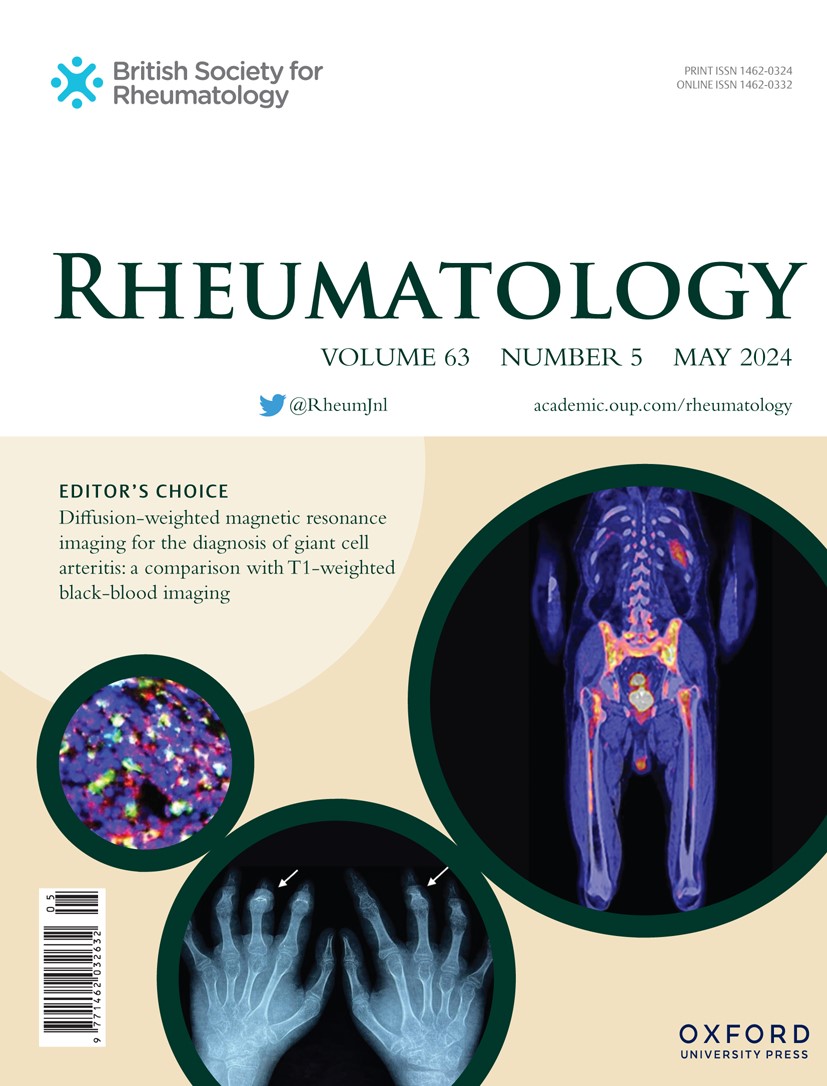Association of systemic sclerosis with risk of premature ovarian insufficiency: a retrospective cohort study
IF 4.4
2区 医学
Q1 RHEUMATOLOGY
引用次数: 0
Abstract
Objectives Premature ovarian insufficiency (POI) is linked to an elevated risk of premature mortality. Nonetheless, evidence regarding the risk associated with POI in systemic sclerosis (SSc) is deficient. This study aimed to evaluate the risk of POI in SSc, offering insights to advance clinical management strategies. Methods Data from the US Collaborative Network in TriNetX regarding 61569984 females were used in this study. Data on females with SSc and without SSc aged 20–40 worldwide from 2005 to 2022 were gathered. Propensity score matching (PSM) was used to match demographic characteristics, medication, and comorbidities that may affect ovarian function to construct the SSc and matched non-SSc cohorts with a ratio of 1:1. The differences in incidents of POI between the two cohorts were compared. Results A total of 6417 female patients with SSc and 6417 matched individuals were included. The age of the SSc group was 31.9 ± 6.0 years. Patients with SSc were associated with an increased risk of POI compared with the control group [HR = 1.6, 95% CI (1.1–2.2), log-rank test p = 0.017]. This association was consistent across both white and black populations. Notably, the risk was especially increased for SSc aged 30–40 (HR = 1.8, 95% CI 1.2–2.8). Conclusions Our study indicates that SSc is associated with a 1.6 times higher risk of developing POI. It underscores the importance of early evaluation and ongoing surveillance of ovarian health to improve the quality of life in women with SSc.系统性硬化症与卵巢功能不全风险的关联:一项回顾性队列研究
目的卵巢功能不全(POI)与过早死亡风险升高有关。然而,关于系统性硬化症(SSc)中POI相关风险的证据不足。本研究旨在评估SSc中POI的风险,为推进临床管理策略提供见解。方法本研究使用美国TriNetX合作网络61569984名女性的数据。收集了2005年至2022年全球20-40岁女性SSc和非SSc的数据。使用倾向评分匹配(PSM)来匹配可能影响卵巢功能的人口统计学特征、药物和合并症,以1:1的比例构建SSc和匹配的非SSc队列。比较两组间POI发生率的差异。结果共纳入6417例女性SSc患者和6417例匹配个体。SSc组患者年龄为31.9±6.0岁。与对照组相比,SSc患者发生POI的风险增加[HR = 1.6, 95% CI (1.1-2.2), log-rank检验p = 0.017]。这种关联在白人和黑人人群中都是一致的。值得注意的是,30-40岁SSc的风险尤其增加(HR = 1.8, 95% CI 1.2-2.8)。结论:我们的研究表明SSc与发生POI的风险增加1.6倍相关。它强调了早期评估和持续监测卵巢健康对改善SSc妇女生活质量的重要性。
本文章由计算机程序翻译,如有差异,请以英文原文为准。
求助全文
约1分钟内获得全文
求助全文
来源期刊

Rheumatology
医学-风湿病学
CiteScore
9.40
自引率
7.30%
发文量
1091
审稿时长
2 months
期刊介绍:
Rheumatology strives to support research and discovery by publishing the highest quality original scientific papers with a focus on basic, clinical and translational research. The journal’s subject areas cover a wide range of paediatric and adult rheumatological conditions from an international perspective. It is an official journal of the British Society for Rheumatology, published by Oxford University Press.
Rheumatology publishes original articles, reviews, editorials, guidelines, concise reports, meta-analyses, original case reports, clinical vignettes, letters and matters arising from published material. The journal takes pride in serving the global rheumatology community, with a focus on high societal impact in the form of podcasts, videos and extended social media presence, and utilizing metrics such as Altmetric. Keep up to date by following the journal on Twitter @RheumJnl.
 求助内容:
求助内容: 应助结果提醒方式:
应助结果提醒方式:


